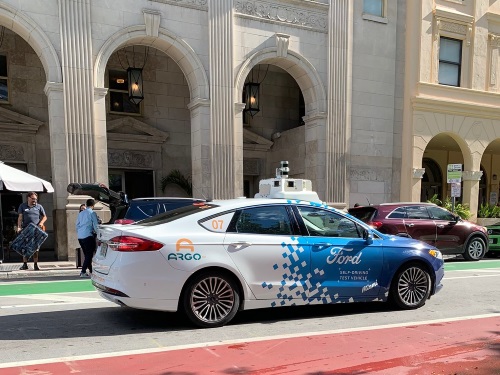The first in a series of quarterly studies compiled by J.D. Power and SurveyMonkey finds that consumers “lack confidence” in the future of self-driving and all-electric battery-powered vehicles.
The inaugural J.D. Power 2019 Mobility Confidence Index Study, which polled 5,749 consumers about self-driving vehicles and 5,270 about battery-electric vehicles or BAVs, gauges “sentiment” in three categories: low (0-40), neutral (41-60) and positive (61-100). The study found that the current “Mobility Confidence Index” is 36 on a 100-point scale for self-driving vehicles and 55 for battery-electric vehicles.

“Out of the box, these scores are not encouraging,” said Kristin Kolodge, J.D. Power’s executive director for driver interaction and human machine interface research, in a statement.
“As automakers head down the developmental road to self-driving vehicles and greater electrification, it’s important to know if consumers are on the same road – and headed in the same direction,” she said. “That doesn’t seem to be the case right now. Manufacturers need to learn where consumers are in terms of comprehending and accepting new mobility technologies – and what needs to be done.”
The study found that scoring lowest among the self-driving attributes are: comfort about riding in a self-driving vehicle (34) and comfort about being on the road with others in a self-driving vehicle (35).

It also found that although consumers are more hopeful than worried (65 percent versus 34 percent) about the overall benefit of technology in their lives, 39 percent aren’t excited about any self-driving technology, including delivery services, public transit, taxi/ride-hailing service and personal vehicles.
Serious concerns also exist with the development of self-driving vehicles, of which consumers are most worried about tech failures/errors (71 percent), risk of vehicle being hacked (57 percent), and legal liability as a result of a collision (55 percent).
[State DOTs are involved in a variety of efforts to try and change those perceptions. Transportation TV recently highlighted one such initiative being undertaken by the Utah Department of Transportation and the Utah Transit Authority.]
However, in an interesting twist, consumers believe self-driving vehicles – in some cases – will become commercially available faster than the timeline predicted by industry experts.
J.D. Power and SurveyMonkey found that industry experts anticipate self-driving services – public transit, delivery and taxi/ride-hailing –will arrive to market in five to six years, while self-driving vehicles for purchase will arrive in about 12 years. Yet consumers predict each mobility option will be available in closer to 10 years.
When it comes to all-electric battery-powered vehicles, consumer attributes scoring lowest include likelihood of purchasing an electric vehicle (39); reliability of electric compared to gas-powered vehicles (49); and ability to stay within budget compared to gas, diesel, or hybrid vehicles (55).
[Dave Lauzun of Siemens PLM Software discusses some of those challenges in the video below.]
Though most consumers polled by J.D. Power and SurveyMonkey, regardless of age, believe there are positive environmental effects of electric vehicles, they believe it will be “well over a decade” before electric vehicles equal petroleum-powered vehicles in sales volume.
The study found that the major challenges facing efforts to increase battery-electric vehicle acceptance include vehicle affordability, alongside infrastructure and battery concerns – summed up as “cost, range, and supply capacity” issues, with 64 percent of those consumers polled most concerned about the adequate availability of charging stations, while 59 percent are most concerned about vehicle range.
 Top Stories
Top Stories
USDOT Makes $1.5B Worth of BUILD Grants Available
December 19, 2025 Top Stories
Top Stories

